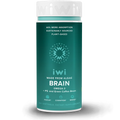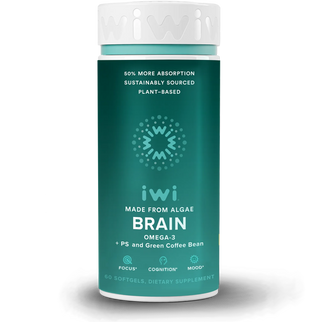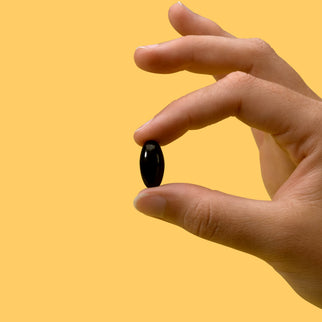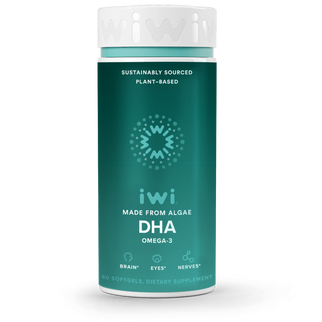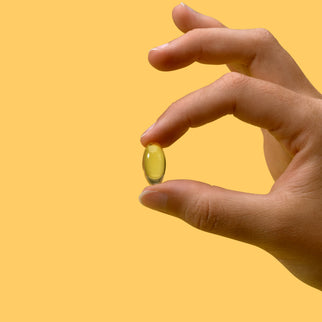We know how important it is to care for yourself and your baby during pregnancy — more than anything, you want to ensure the health and safety of your child. One of the best ways to make sure you both are staying happy and healthy is through prenatal vitamins!
Prenatal supplements can greatly benefit you and your growing baby, but it’s important to know what kind of ingredients you should look for and how much you should take.
One of the most common ingredients that you’ll see on the labels of prenatal supplements is docosahexaenoic acid (DHA), which offers many different health benefits.
What is DHA? Why is it important, and how much do I need? Don't worry. That's what we'll explore in this article!
iwi life is here with seven things you should know about DHA during pregnancy.
How Much DHA Do You Need During Pregnancy?
So, how much DHA do you need during your pregnancy? Research varies on the amount, and it differs depending on your age — so, if you’re unsure, it is best to consult a health professional or doctor.
Generally, doctors recommend getting at least 200 milligrams of DHA before, during, and after pregnancy.
Typically, many prenatal vitamins will contain this recommended amount, but there has been research that shows that higher amounts of 500-600 mg of DHA may support a healthy pregnancy term and healthy baby weight at the time of birth.
Doctors generally advise to not take more than 1,000 milligrams of DHA each day because there has been no proven evidence to suggest that your or your baby will receive any extra benefit from this high dose.

Our DHA Omega-3 supplement can help you get the 500 milligrams of DHA you need
— along with other crucial omega-3 fats.
Here are seven key things you should know about DHA for a healthy pregnancy.
1. DHA Is an Omega Fatty Acid
Docosahexaenoic (we know it’s a mouthful) acid is an omega-3 fatty acid and is considered to be an essential fat. Potential benefits of DHA include support for heart health, vision, and an overall healthy inflammatory response.
Getting enough DHA is also essential for brain development and general fetal development during your pregnancy, so many doctors recommend taking a DHA supplement or prenatal vitamins before, during, and even after your pregnancy.
2. Omega-3s Are Essential for Overall Wellness
There are three main omega-3 fatty acids:
- Alpha-linolenic acid (ALA)
- Eicosapentaenoic acid (EPA)
- Docosahecaeonic acid (DHA)
ALA is typically found in flaxseed, soybeans, and canola oils, while EPA and DHA are found in fish and other seafood.
Since they are all essential fatty acids, your body can’t produce them on its own. ALA functions almost more as a precursor to omega-3: your body still needs to work to convert it into DHA, and then EPA. In healthy adults, the conversion rate may be around 17%. That’s why it’s important to get EPA and DHA from foods and supplements to increase these levels for a healthy pregnancy.
Omega-3s make up an important part of the membranes surrounding each cell. For example, DHA levels are high in the eye, brain, and sperm cells.
They can also provide calories to help give your body energy as well as support functions in your heart, blood vessels, lungs, immune system, and endocrine system.
3. DHA Supports a Healthy Pregnancy

Your brain and your baby’s brain contain high fat content and have a lot of different nerve connections. DHA can help you and your baby form these different processes during your pregnancy.
DHA is good for you and your baby since it’s often associated with fetal growth and development, but it has many other health benefits.
Research on DHA and fatty acid supplementation shows benefits for you, such as:
- A 2020 research review suggests the DHA may help improve your moods from late pregnancy into early postpartum.
- Research suggests that DHA may reduce the risk of premature birth.
It can help support you while growing your baby since it can help:
- Ensure a healthy birth weight
- Help develop your baby’s brain, eye, and nervous system development
Essentially, not only does it help your baby’s development in multiple areas, it also helps with your pregnancy outcome.
However, some moms are worried about taking fish supplements, so not to worry! That’s why we made our Omega-3 Supplements from algae.
4. DHA Supports Brain Development
Your baby’s brain development starts at around five weeks, but it’s an ongoing process throughout your pregnancy.
Your baby’s brain development may benefit from a DHA supplement each trimester! Here is where DHA can improve your baby’s brain development:
- Cerebrum: responsible for your thinking, feeling, and remembering
- Cerebellum: responsible for your motor control
- Brain stem: responsible for keeping your body alive
Your baby’s brain development will peak during the third trimester, so this is when it’s most important for you to take supplements and make sure you’re getting the proper amount of DHA.
5. DHA May Reduce Pregnancy Complications and Risks
Here are some other possible benefits of taking DHA supplements:
- Possible links to better neurodevelopmental health
- Research suggests a link between a mother’s DHA intake and their child’s performance on language and short-term memory tasks at ages five and six.
- One study suggests a connection between moms that take DHA and children with good vision.
6. DHA Remains Important Postpartum

There are also benefits for your baby after birth. It’s recommended that if you are breastfeeding, you should still take at least 200 milligrams of DHA postpartum.
For one thing, higher levels of DHA in early childhood are linked to enhanced cognitive development and performance, and possible increased speed in performing mental tasks.
Here are some further benefits that DHA can provide for you, whether or not you’re pregnant:
- Can support your brain health — one study shows supplements of both DHA and EPA may help support overall cognitive function and performance.
- Possible beneficial effect of omega-3 fatty acids on those with mood issues.
- May reduce the risk of certain chronic health conditions, but more research is needed.
7. You Can Get DHA From Your Diet
DHA is found in natural foods, but it can be difficult to eat enough of these foods to maintain proper DHA levels, especially if you’re pregnant.
Since DHA is found in fatty fish, and if you’re pregnant, it can be hard to get the adequate levels you need. Doctors typically recommend that you avoid seafood because of the possible high mercury levels.
So, what should you do?
We recommend our DHA algae supplements. It’s a clean and sustainable source of DHA and is a helpful way to support your brain, nervous system, vision, and overall wellness.
Our products are made from nature’s richest supply of DHA: algae. Our iwi life algae yield more essential amino acids and vital nutrients, all while using fewer resources than traditional farming, and providing 50% better absorption of omega-3 than fish or krill oil.
There are also possible side effects that come from taking fish oil. We didn’t want to risk it for you, your baby, or the environment, so we focused on making algae supplements containing DHA.
We are big fans of DHA supplements at iwi life because we know the good they can do for you, your baby, and the global community. It is widely advised by doctors that DHA supplements are safe and beneficial, especially when you’re pregnant.
We also go a step further in avoiding producing supplements made from fish or krill oil, instead focusing on supplements made from sustainably sourced farming methods with algae.
Always make sure to talk to your doctor about any questions or concerns you have. Keep in mind that DHA supplements aid you and your baby throughout your pregnancy, but they should not be taken to treat or prevent any diagnosis.
Choosing iwi life for Your DHA Supplements
We know that you care about your health and the health of your baby. You want to do what’s right for you and your little one, and it can be overwhelming to know what to do since there is so much information out there.
At iwi life, we focus on you. We know how to help you, so we keep it simple with our supplements that are designed with your benefit in mind.
We pride ourselves in full transparency because we believe in what we do – and because not only do we care about your health, we care about the health of our planet. That means creating products that feed and protect the planet.
Our commitment to sustainable sourcing, farming, and distribution has allowed us to see different opportunities to take care of you and our global community.
Not only do we make products that benefit everyone, no matter their sex or age, but we also are dedicated to making sure you have the information you need to support yourself and your family.
We plan on achieving these goals by making our products widely available to our global community. We are dedicated to helping everyone with their wellness goals –– whether it’s helping your cholesterol, brain, eyes, heart, or any of your systems –– iwi life is here to see it through.
Sources:
The Mothers, Omega-3, and Mental Health Study: a double-blind, randomized controlled trial
DHA supplementation and pregnancy outcomes | PMC
Update on alpha-linolenic acid | Nutrition Reviews | Oxford Academic












